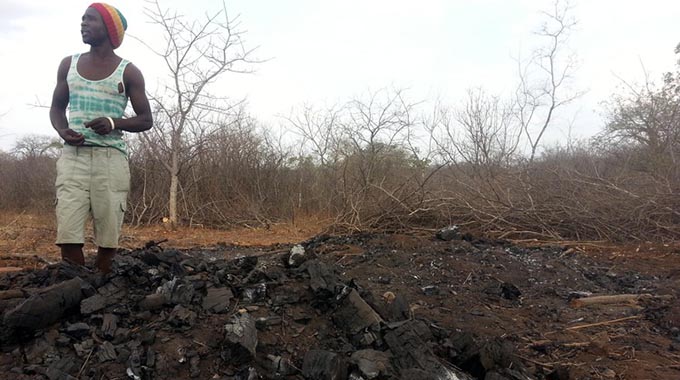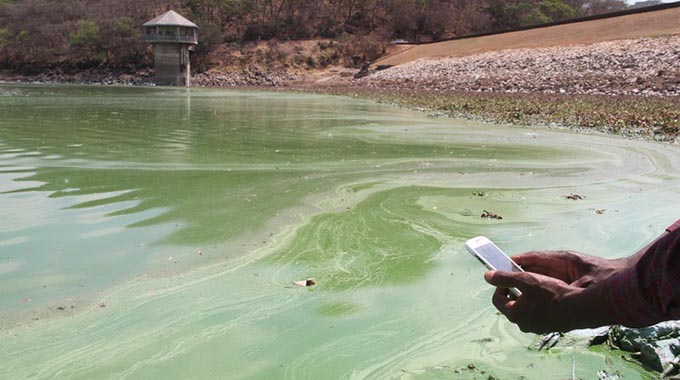A peek into world of charcoal syndicates

Daniel Nemukuyu Investigations and Special Reports Editor
CHARCOAL trading syndicates run by Harare gangs are racking up huge profits by exploiting poor rural people who are illegally destroying hardwood forests to make the charcoal. The charcoal is then sold in thriving markets in the city’s residential areas, where power cuts are a big problem, pushing gas and paraffin prices beyond the reach of many consumers.
The gang members, who smuggle the charcoal into Harare in the dead of the night in covered trucks to avoid detection, pay the charcoal makers $10 a bag but sell the same bag in the city for $75.
Profits of that scale are driving the business and fines, if ever levied, are trivial.
The final price is only limited by the price of gas and paraffin.
To be attractive to urban households it has to be cheaper to use than both but the rising price of both petroleum fuels has allowed the gangs to raise the price of their bags without necessarily paying the poor rural communities, who face higher risks of prosecution, any more.
Most households want to cook at lunchtime and in the evenings, hours before Zesa Holdings generally restores electricity supplies, hence the need for alternative fuels.
The police, Forestry Commission and the Environment Management Agency (EMA) are supposed to monitor charcoal sales and prevent unlicensed production and sales, but little is done to enforce the laws, in particular the Forestry Act.
The most affected communities include Muzarabani, Mudzi, Hwange, Chiredzi and Mt Darwin.
Under Statutory Instrument 116 of 2012, the maximum fine for those who cut down or wrongfully possess firewood is $400, a fine that can hit the charcoal makers but not the syndicates.
The same instrument classifies charcoal as firewood for the purposes of enforcement.
However, enforcement of the law has proved problematic as the Forestry Commission finds it difficult to prove whether or not the charcoal was produced in Zimbabwe.
The Herald visited Gozi and Rwenya areas in Mudzi, where woodland is being destroyed daily and communities have been turned into deserts due to deforestation.
Containerised trucks could be seen parked at local shopping centres during the day, while the dealers were busy negotiating with charcoal suppliers in the villages.
At Chitungwira shops in Gozi, a group of young men was busy marketing charcoal to customers coming from towns.
These youths are middlemen, linking charcoal makers and charcoal buyers for a fee and doing the vetting of potential buyers to ensure they are genuine, and not law enforcement agents.
Suppliers of charcoal appreciate the business is illegal, hence they do it secretly.
This writer, disguised as a potential buyer, enlisted the services of a dreadlocked young man, popularly known as “Rasta” who charged $10 to take him to Mr Gilbert Musaki’s workshop at the heart of the remaining thick forest in the village.
Mr Musaki was busy working on his stacks of Mopani and other hardwood logs while earth mounds already covered other carefully arranged log piles to burn the charcoal.
“I cut about 30 trees to be able to produce about 80 bags of charcoal. The mound that I am currently working on is expected to produce about 150 bags of charcoal.
“I started cutting trees some three months ago after a Mbare trader placed an order for 150 bags of charcoal.
“A lot is involved in the process. After cutting the trees, we pile them into stacks before covering the stacks with soil.
“On this stack, I cut down about 60 big trees, put some grass or tree leaves on the stacks before heating,” he said.
Mr Musaki was selling his charcoal for $12 per bag.
The bags of charcoal are not loaded until around 9pm to ensure they travel at night when there are few police roadblocks.
One of the hired truck drivers, who was at Gozi Shopping Centre, said they usually arrive in Harare at around 2am.
“We usually get into Harare between 1am and 2am and we offload the charcoal at selling points in Mbare or Chitungwiza. Once the charcoal is in Harare, no one can tell its source and the traders will not be afraid of the police or the Forestry Commission officers,” he said.
Despite the Forestry Commission’s joint operation with the police and EMA dubbed “Operation Huni Wadziwanepi” illegal charcoal production and sale continues to thrive.
Mudzi South legislator Cde Jonathan Samukange described the situation as dire, saying law enforcement should be strengthened to save the forests.
He said some police officers are being bribed to allow the truckloads pass without search or arrest.
He proposed empowering traditional leaders to severely punish those who cut down trees and produce the charcoal.
“That is disturbing news. Containerised trucks are always seen ferrying charcoal to Harare from our area but the police and other enforcement agents are not doing anything about it.
“Despite the presence of the police on the roads, the movement of charcoal never stops,” he said.
Forestry Commission spokesperson Ms Violet Makoto said most people arrested in the ongoing blitz argue that they had imported the charcoal.
“People are selling charcoal under the guise that they are bringing it from Mozambique, Zambia and other neighbouring countries where it is permissible.
“However, we have established that the charcoal is now being produced here in some rural communities.
“It remains illegal to produce or sell charcoal here in Zimbabwe and thousands of bags of charcoal have since been intercepted on the major highways,” said Ms Makoto.
Justice Legal and Parliamentary Affairs Minister Ziyambi Ziyambi said the fines gazzetted in 2012 were no longer deterrent considering the currency changes. “We are currently pushing for more deterrent penalties in respect of a number of offences, including those under the Forestry Act.
“We feel the fines have been eroded by inflation and they must be increased for deterrence,” said Minister Ziyambi.
At Mbare, a charcoal dealer told the Herald that her charcoal came from Chirundu.
“Charcoal is produced in many rural communities like Mudzi, Chiredzi, Muzarabani and Chirundu. I prefer the Chirundu type.
“It is made of the genuine Mopani tree and it is easy to market. In other communities, they no longer have enough Mopani trees for charcoal and they end up using alternatives that are no good enough,” she said.
The woman said her deliveries arrive around 2am at Mbare. She said the suppliers strictly sell for cash; generally all illegal business has to be cash to be untraceable.










Comments